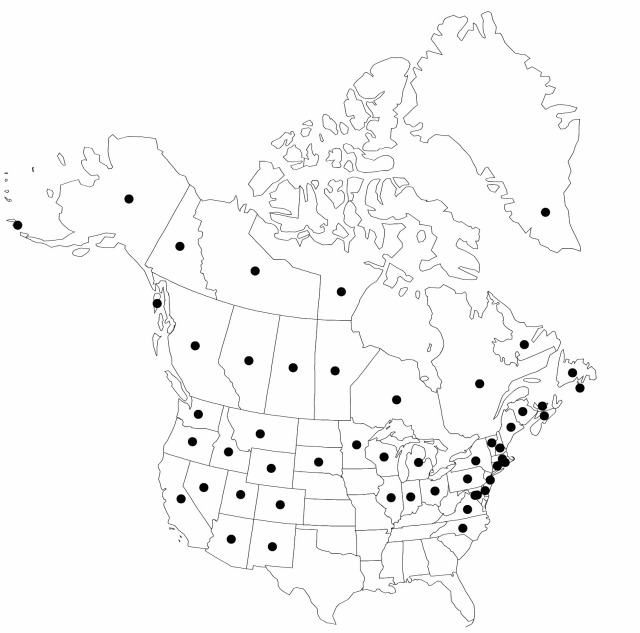Carex canescens
Sp. Pl. 2: 974. 1753.
Plants cespitose, in small and medium-sized clumps; rhizomes short. Culms erect, not stiff, 15–90 cm. Leaves: sheaths pale-brown abaxially, inner band thin, hyaline, sometimes slightly red tinged, concave at summit; ligules slightly longer than wide; blades pale green to gray-green flat, 10–20 (–30) cm × (1.5–) 2–4 mm, subequal to shorter than culms, not stiff. Inflorescences 2–15 cm × 5–10 mm; proximal bracts shorter than to exceeding spikes; distal bracts usually scalelike. Spikes 4–8, gynecandrous, proximal ± remote, distal spikes approximate, sometimes flexuous, containing (5–) 10–20 (–30) perigynia suborbicular to oblong, 3–12 × 3–5 mm; terminal spike staminate for less than 1/2 of length, often clavate due to more conspicuous staminate part. Pistillate scales hyaline with green, 3-veined center when young, usually brownish tinged in age, broadly ovate, subequal to, not concealing perigynia, apex obtuse to acutish. Perigynia appressed-ascending, gray-green, becoming yellowish-brown, obscurely many-veined, elliptic-ovate, 1.8–3 × 1.2–1.7 mm, widest near middle, membranous; beak abaxial suture inconspicuous, small marginal teeth. Achenes pale-brown, oblong-obovate, 1.25–1.5 × 1–1.25 mm, dull to slightly glossy. 2n = 56.
Distribution

Alta., B.C., Man., N.B., N.S., N.W.T., Ont., P.E.I., Que., Sask., Yukon, Alaska, Ariz., Calif., Colo., Conn., D.C., Del., Idaho, Ill., Ind., Maine, Mass., Md., Mich., Minn., Mont., N.C., N.H., N.J., N.Mex., N.Y., Nev., Ohio, Oreg., Pa., R.I., S.C., S.Dak., Utah, Va., Vt., Wash., Wis., Wyo., South America, Eurasia, Australia, New Guinea
Discussion
Subspecies 2 (2 in the flora).
Selected References
None.
Key
| 1 | Culms 15–60 cm; inflorescences 3–5(–7) cm, all but proximal spikes approximate or slightly remote. | Carex canescens subsp. canescens |
| 1 | Culms 30–90 cm, inflorescences 6–12(–15) cm, all but distalmost spikes distant, proximal 2 spikes 2–5 cm apart. | Carex canescens subsp. disjuncta |
"shortened" is not a number.No values specified.